Preventing marine pollution vital - Dr. P.B. Pradeep Kumara
By Naalir Jamaldeen
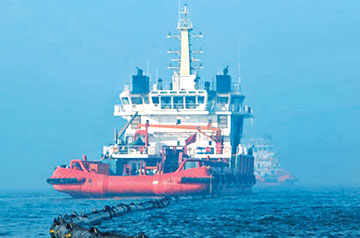 |
| A ship
cleaning an oil spill |
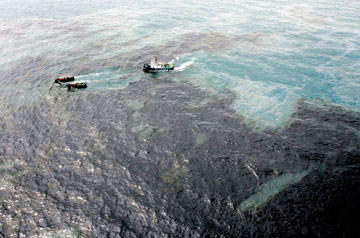 |
| Oil polluted
sea area |
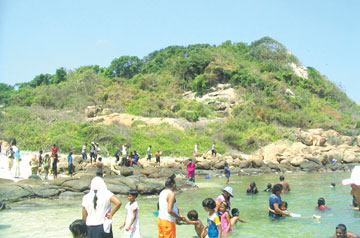 |
| Pigeon Island
Marine Park |
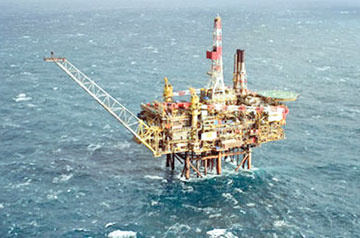 |
| |
 |
| |
|
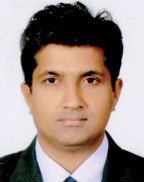
Dr. P.B. Terney Pradeep Kumara
|
“We have to play a key role to prevent marine environment pollution
by 2016. At the same time we have to conform to international standards.
It is only then that we can attract more foreign ships to our
harbours”, General Manager, Marine Environment Protection Authority (MEPA),
Ministry of Environment and Renewable Energy Dr. P.B. Terney Pradeep
Kumara said in an interview with the Sunday Observer. Ballast water
management is one of the key areas assigned to the MEPA. When the cargo
in the ship is unloaded or oil pumped to tanks, the ship loses its
weight.
Then the ballast tanks in the ship fill with marine water to balance
the ship. When the ship loads cargo or fills oil in another country the
water in the ballast tanks is disposed to the sea. Marine animals in the
ballast tanks goes to a new sea environment. This causes social,
environment and economic problems to those countries. Similarly our
waters too receive some invasive species from the ballast water, Dr.
Pradeep Kumara said.
Besides, Dr. Pradeep Kumara said "We do not allow polluted oil to be
dumped in our marine environment. We follow a number of in rules
relation to the disposal of polluted oil. We pump the polluted oil into
a reception facility. While helping to protect the marine biodiversity
we receive foreign exchange by providing this service", he said.
“The Marine Environment Protection Authority (MEPA) conducts research
jointly with other Departments, Agencies and Government and Private
sector Institutions to prevent and reduce the sea from being polluted by
ship based activities.
The MEPA effectively and efficiently administers and implements the
provisions of Marine Pollution Prevention Act and the Regulations. The
MEPA is the top level institution set up by the Government, under the
Marine Pollution Prevention Act No. 35 of 2008, with the responsibility
of preventing, controlling and managing the pollution in Sri Lanka's
Marine Environment. Marine environmental issues are now being discussed
as pollution has become a threat to our own existence.
He said that the MEPA conducts awareness programs for the people at
Colombo, Negombo, Puttalam, Kalutara, Galle, Matara and Hambantota
offices to make them aware of the urgent need to stop polluting any
water body in the country as eventually it affects the sea.
MEPA formulates and implement the national oil pollution contingency
plan. It also oversees, regulates and supervises the conduct of
contractors, sub contractors and persons conducting or engaged in
exploration of natural resources including petroleum or related
activities to create awareness of the need to preserve the marine
environment, Dr. Pradeep Kumara said.
The MEPA has introduced various mechanisms to effectively safeguard
and preserve the territorial waters of Sri Lanka.
MEPA conducts investigations, inquiries and institutes legal action
in relation to any pollution, arising due to ship based activities or
shore based maritime related activities, oversee all sea transport of
oil, oversee all sea transport of oil and bunkering operations that are
carried out in the territorial waters of Sri Lanka or any other maritime
zone declared under the maritime zones law, Dr. Pradeep Kumara said.
“It mainly focus attention on controlling the pollution in the ocean
caused by ship and land based activities. We have an area of 200
nautical miles from the shore. Attention is paid on sea dumping, ballast
water management, oil pollution and the pollution caused by the ship or
the movement of other vessels, boats or fishing vessels", he said.
“Attention is also paid on the land side on the disposal of waste
from hotels, swimming pools and industries in close proximity to the
coastal belt. Infrastructure and manpower are the main problems. We
should have a good surveillance system to prevent marine pollution. When
oil is added to water, the whole water column becomes toxic. Planktons
and small eggs are destroyed. Ultimately it impacts marine biodiversity,
fisheries activities and finally affects tourism activities”, he said.
“We have imposed various regulations to regulate the maritime
industry. We conduct biological surveys in the coastal belt about
pollution level, present condition of biodiversity and the impact to the
biodiversity caused owing to dumping waste in the coastal belt. This
data can be useful to hold awareness programs for the community and
officers in the sector as well”, he said.
Oil quickly dissolves in marine water. When oil is added to the sea
it blocks the light penetrating to the deeper layers of the sea. Animals
and plants in the bottom do not receive sunlight and will face death
ultimately. Disposing plastic and polythene waste has become a major
threat to the environment”, Dr. Pradeep Kumara said.
“I appeal to minimise the use of polythene and plastic items in the
country. Waste should be disposed in an environment friendly way. To
protect our coastal belt is the bounden duty of all. Whatever is in the
central country, finally it ends up in the coastal belt affecting marine
biodiversity. Attention should be paid towards recycling used polythene
and plastic items and minimise the use of polythene and plastic items in
day-to-day use”, he said.
Pigeon Island is located around 1 km away from the Nilaveli beach.
This consists of two islands such as a larger island and a small
island. Pigeon island is the best places to see live coral in the
island. It is a unique feature to this area. Turtles, reef sharks,
dolphins and some other marine mammals endemic to Sri Lanka can be seen
here, he said.
Pigeon island is one of the four marine parks in the country.
Hikkaduwa, Rumassala and the bar reef in Kalpitiya are the other three
marine parks in the country, he said.
“During the trouble times, the coastal belt of the North and East
remained untouched as far as tourism promotion was concerned.
We are aware of the pristine nature of that environment. Now the time
has come to promote the tourism industry in the North and the East while
rebuilding the fishery industry.
While promoting tourism, measures should be taken to protect the
biodiversity in these areas. Steps should be taken to minimise the
coastal belt from being polluted. Attention should be paid towards the
protection of biodiversity”, he said.
“We help the fisheries sector to minimise pollution. Fishermen are
also trained by us to use environment friendly fishing gear in the
fishing process”, he said.
“We get some sort of assistance from the International Maritime
Organization (IMO) to conduct pollution control programs in our marine
environment. We collaborate with local institutes such as the Ministry
of Fisheries, the Ministry of Environment, Ministry of Tourism, Urban
Development Authority and other local agencies. We work hand in hand to
curb pollution and protect the cleanliness of the ocean around the
country”, he said.
He said that unlike those days, now environment friendly ships are
used for cargo and passenger transportation.
Modern technology is used in the shipping industry. The new ships are
more environment friendly than vehicles which pollute the environment.
Our harbour should also have environment friendly legislation", he said.
Meanwhile Dr. Pradeep Kumara said that Sri Lankan waters is famous
for various kinds of species such as marine mammals, blue chip corals.
large marine mammals like blue whales sperm whales bribes whales, bottle
nose dolphins, five species of turtles, shark and white chips. Those are
the characteristic species around our coastal belt, he said. The
protection of these species depends on the protection of our marine
environment. |

